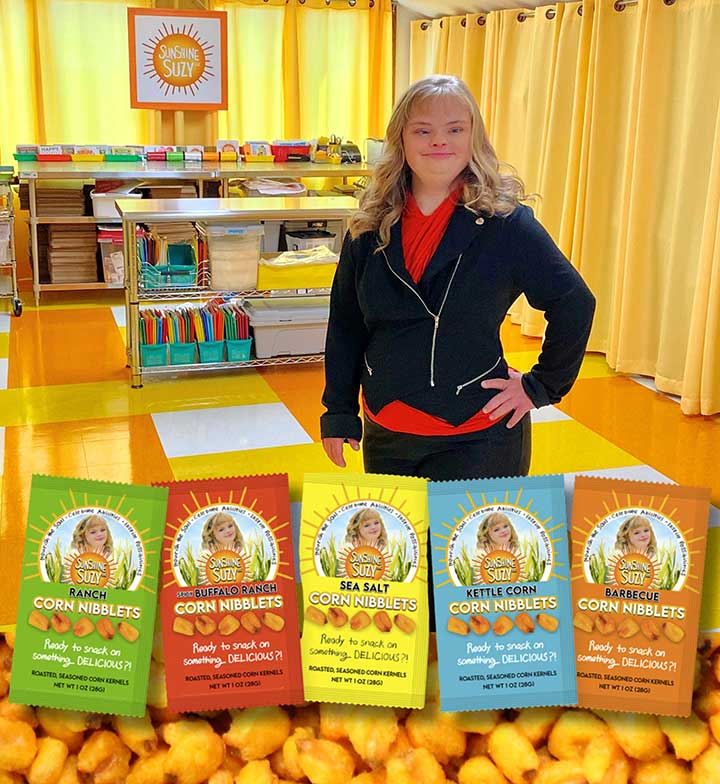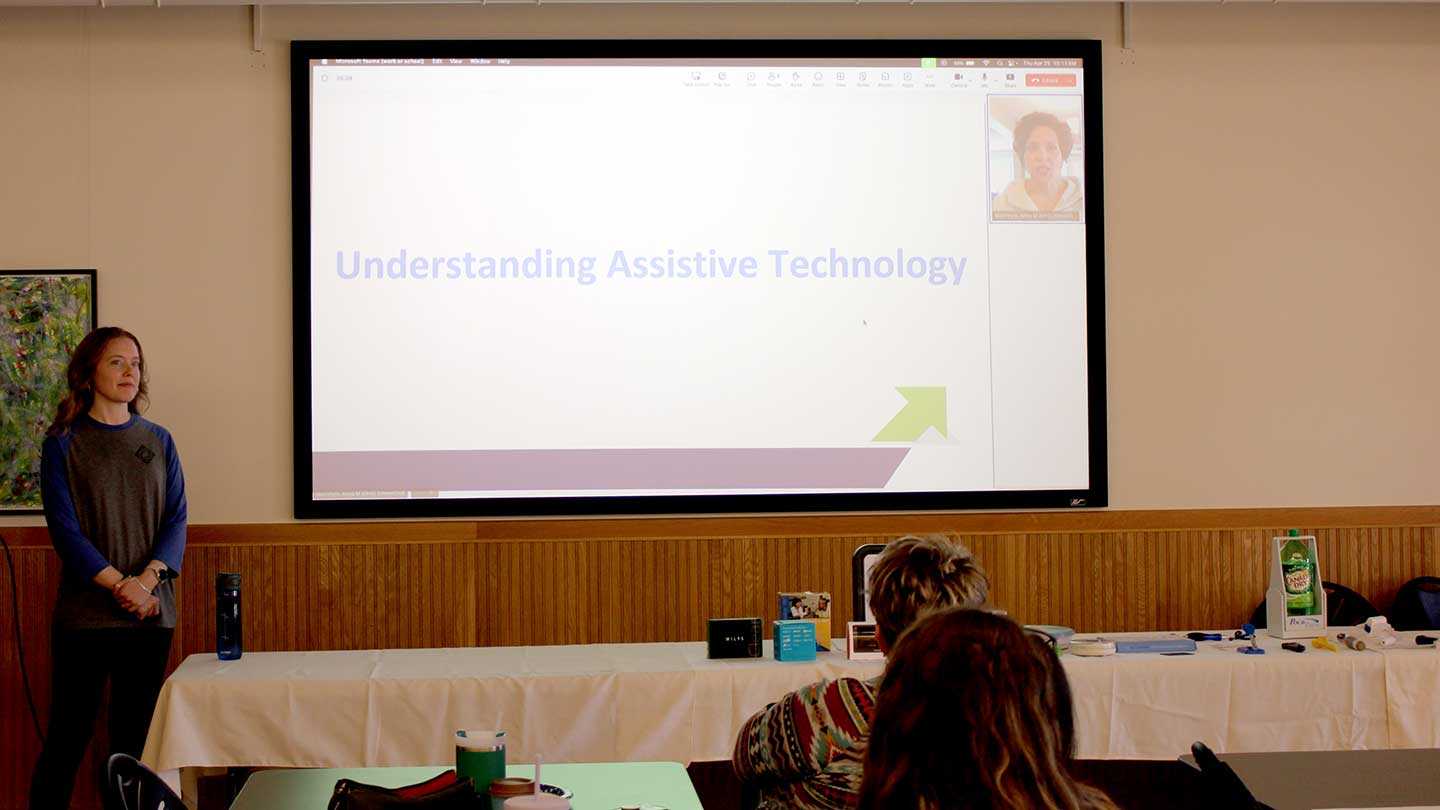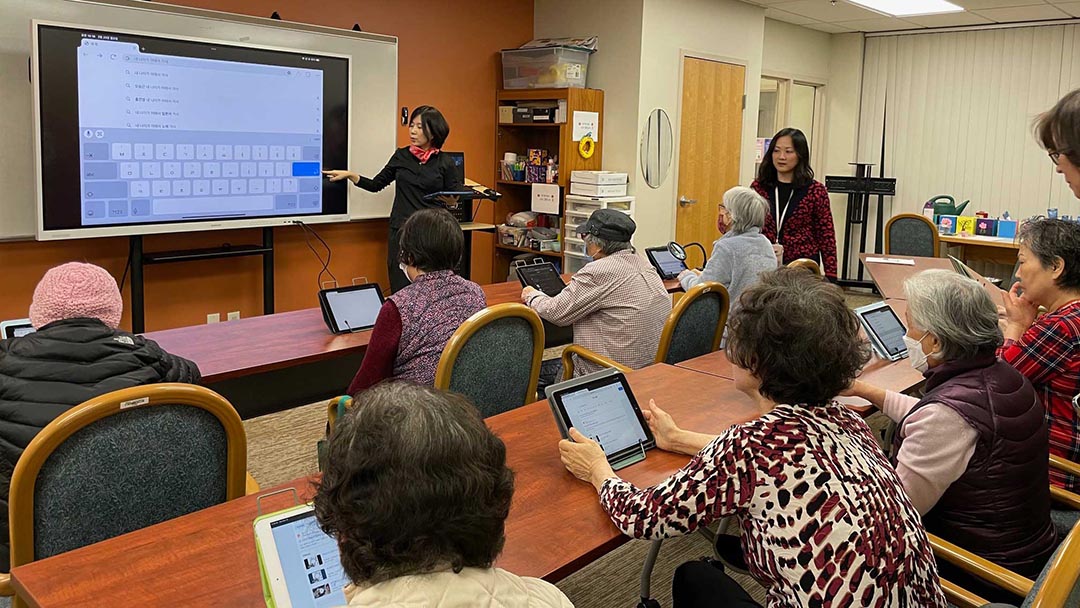Karl suffered a traumatic brain injury in 2004, when he was just 3 years old; in the same tragedy, he lost his father. Despite graduating from high school in 2023, doctors said that hope and joy and meaningful employment were “out of his wheelhouse.” Karl and his family rejected that idea and knew that they could overcome these barriers with a little help. The idea of creating a small business in Northeast Minnesota that could provide meaningful employment for folks with disabilities came into focus.
With the help of a microgrant, their dream of a meaningful vocation for Karl and others like him became a reality and they started their own candle-making business: Karl’s Wheelhouse . The microgrant allowed them to purchase all the needed equipment to start making candles and etchings, powered by Karl.
“This grant sped up the access to equipment that allows us not only to create items of which we are proud, but also generate income to keep this business not just afloat but thriving. We thank you powerfully!”
– Dawn Lampros, microgrant program manager

Suzy owns her own business called Sunshine Suzy's Corn Nibblets. Her business is growing so she applied for a microgrant to help get supplies for shrink wrapping her boxes. The items she received helped her save time spent wrapping and taping her product for shipping. The shrink wrap film and tape also helped her prepare to work on larger orders. She is very thankful for the generous assistance and we are all excited to see her business continue to grow. For more information, visit www.sunshine-suzy.com .
– Buff Hennessey, director of statewide grants and initiatives
"An individual recently moved into one of our service locations, 33 Nicollet, after a period of being unhoused and living outside. He came in untrusting of staff and not open to sharing much personal information. Staff were able to slowly build rapport and connections with him and learn more about his health needs. He has become more open to accepting help with services. And the staff have been able to refer him to PCA services and help him access some supports for his mobility needs, including a bath chair and a wagon. Though he is not completely trusting of and open with staff at this time, staff continue to work on building trust with the individual in hopes that additional needs can be addressed. Stories such as these are common in our programs and are a testament to the importance of creating a safe and supportive environment for people to have their needs met."
– Anne Boone, senior director of community mental health
"The SPAN conference brought families and service providers together to build connections and to have honest conversations about stigma and the systemic challenges faced by families of children with autism. One of the speakers that SPAN recruited, Anisa Hagi-Mohamed, gave a presentation on the most harmful rhetoric we hear about disabled people. She talked about some of the most common stereotypes made about autistic people. She also gave examples of what to say back to people who are stigmatizing autism and the responses were incredible. In her most salient example, Anisa spoke about a community movement to change the Somali word for autism. Developed in collaboration with colleagues like Dr. (Hussein) Awjama, Anisa described a collaborative conceptualization of a new word: 'maangaar.' While previous translations referred to autism as 'slow' or 'crazy,' the new word translates to 'unique mind,' a considerably more positive turn of phrase. SPAN fully promotes the usage of this word in a larger community battle against deeply rooted stigma. The word 'maangaar' was incredibly well-received at the conference by families and professionals alike, in large part because there is a collective understanding of the inherent connection between stigma and the lack of nuanced or positive disability language. Having a word like 'maangaar' pushes in the right direction in destigmatizing autism in Somali-speaking communities."
– Mahdi Warsama, chief executive officer /Somali Autism Project director

"One of our favorite outcomes was during an in-person training with the ARC when we showed some high-resolution, large-print measuring spoons. An individual attending the training shared that she had been slowly losing her vision and absolutely loves to bake, but it had been getting harder for her. She had no idea that high-resolution baking utensils were available to help her. She picked up the spoons and said she could see them so well. After the training, she let us know that she had already ordered them from Amazon and was really excited to use them. It was wonderful to see such a direct and immediate impact from the training.
"We conducted a training for a provider organization that has been ahead of the curve in using technology. They were early adopters of remote support services and were featured in an ARRM video showcasing remote support years ago. During the training with the agency, we decided to show the video, which included some of the people who still work for the agency and were attending the training and two individuals the agency still provides services for. Surprisingly, most of the attendees had never seen the video, but they all knew the two individuals highlighted in it, showcasing their remote support home and talking about how awesome it is to live independently. Two amazing things happened when we showed this video: people were getting choked up and teary-eyed seeing the individuals when they first started with remote support, and since then, one of the individuals has actually moved into his own apartment and is now married."
– Alaina Gallagher, executive project manager

"In collaboration with the Korean Service Center (KSC) CCC program, the iPad class was conducted at the KSC Minneapolis office. This educational session was designed to empower seniors by teaching them how to search for information using their iPads. The goal was to bridge the digital divide and enhance their technological proficiency, fostering connections and reducing feelings of loneliness and isolation.
"To ensure the class was engaging and easy to follow, a practical and interactive approach was adopted. By mirroring the iPad screen to a large display, every step of the instruction was projected clearly for all participants to see. This method allowed the instructor to demonstrate each action in real time, providing visual guidance alongside verbal instructions. As a result, seniors were able to follow along with their own devices, seeing exactly where to tap and what to look for on their screens."
– Kwangja Kwon, executive director
"We helped several families through the appeals process this quarter. It seems that in recent months, many counties have developed a more restrictive approach to CDCS, resulting in many goods and services that have been approved in the past now being denied. The advent of (the) MnCHOICES (revision) has also resulted in substantial reductions in CDCS budgets for people with disabilities. Many families are reluctant to engage in the appeals process because it often feels intimidating and frightening to them. We walk through the process with families, often helping them file the appeal, talking them through what to expect, where to find the documentation they need, and how to make their case. Of the six families we have helped file appeals, only two have resulted in an actual appeal hearing. The other four were able to be resolved in conversations between the family and their case manager. We have not yet heard back on the result of the appeals, but the families reported feeling more supported and less intimidated by the process."
– Ellie Wilson, executive director, AuSM
"HT is the mother of a client we have been working with for several years. The first time we met with her, she called for help with the IEP process. We talked to her several times before the IEP meeting to learn about her child, what she felt was going well, and understand what she wanted to work on. This client was terrified of the IEP process and worried herself sick that she was not doing enough for her child. Most people do not understand how intimidating this process can be. We started attending IEP meetings with her, translating all the documents for her, setting up preparation meetings before and debriefing meetings after each meeting to make sure she understood everything that was discussed and what next steps would be. We provided her with written summaries of the notes from all we discussed and translated those notes for her.
"The last meeting we attended with this mom was early this summer, and our whole team remarked on how she was a completely different person from when we first met her: confident, comfortable asking questions, knowledgeable about her rights, and confident in asserting her opinion when she disagreed with what the school proposed for her child.
"So many of our disability systems assume that parents will be the best advocates for their children, but these systems don't really do a very good job of preparing families for this role. This kind of long-term intensive ongoing support is rare, but can be life-changing both for the child and for their parent."
– Maren Christenson, board member, Multicultural Autism Action Network
"With the help of the Minnesota Department of Human Services Innovations Grant, RSI was able to develop an emergency grant and interest-free loan program to help employees continue employment after experiencing an unforeseen financial hardship. The grant and loan program has been a great success with 50 loans and 65 grants given out to employees since the start of the program in May 2023. Employees express immense gratitude for the financial assistance that the grant and loan program provides to them for things such as housing costs, vehicle repairs and basic need items. RSI has been able to maintain that program while developing other resources to assist with transportation and mental health as well. An employee who was recently out of work for medical issues wrote the following statement on a survey when asked about the way in which RSI’s employee resource program benefitted them and helped them maintain employment:
'I took personal leave to have surgery on my right shoulder. I did not qualify for FMLA. No other income. I applied for grant/loan. They responded immediately and were able to help me get back and forth to work and also with food grant and a loan.'
"Another RSI employee was able to utilize grant funding for gas money and groceries to get back on her feet after being hospitalized for a medical emergency. She has now been employed with RSI for 4.5 months and when asked if she was able to improve her situation she responded 'Yes absolutely. So appreciative.' "
– Jon Nelson, executive director
"Rachel has always wanted to have her own business 'blinging.' She has always loved to bling many of her own belongings but also, whatever anybody asked her to bling.
"Rachel was working on custom projects, selling blinged tumbler cups to friends and family. Her dream though, was to get her products to the people and expand her business. Rachel approached Rise staff when she noticed that another individual was working on their own microbusiness.
"Rachel worked with Rise staff to set up a plan and identify her goals and outcomes. In the beginning, Rachel was buying one tumbler, bedazzling it and selling it to afford another tumbler to make. She needed to increase her stock so, with help from Rise staff, Rachel applied through Rise’s Advancing Lives fund for supplies and was awarded $500 for products. Rachel filled out and applied for her first grant thought The Arc Minnesota’s Micro Grant program and was awarded $1,000 for products. Rachel then received funds through Rise’s DHS Innovation grant and was awarded multiple supplies to help get her business set up and going. With the Innovation grant funds, Rachel was able to purchase an accessible work desk and cabinet for her home office, beads, glue, tumblers, products to fill her cups, lip balms to bead, pens to bead, purchasing receipts and supplies for her first craft fair.
"Rachel worked with Rise staff to create communication for her business. She created flyers, business cards and a virtual resume.
"Once Rachel received her products, she was ready and worked with Rise staff to book her first craft fair. Rachel worked hard for over a month to build up her supply to sell at her first craft fair. The craft fair was held at the Andover Community Center and It was a huge success with Rachel selling her products to the public for the first time. This won’t be the last as Rachel is on the lookout for another fair to sell at. Rachel is so thankful for all the help she has received from Rise staff and the generous funds from DHS, The Arc Minnesota and Advancing Lives Funds that have helped make her dream come true."
– Jennifer Nedegaard, employment exploration specialist